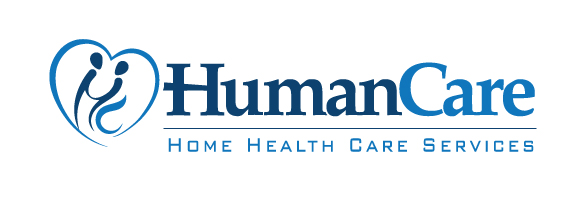The Importance of Geriatric Care Management for Seniors and Their Families
Understanding the Vital Role of Geriatric Care Managers

Aging Gracefully: Understanding the Need for Geriatric Care
As the population ages and the demand for comprehensive care for older adults increases, the role of geriatric care management has become more significant than ever. This specialized field focuses on ensuring that seniors receive holistic, personalized care that addresses not only their medical needs but also their emotional, social, and practical requirements. Geriatric care managers, often highly skilled professionals like nurses or social workers, play a pivotal role in navigating the complex journey of aging, enhancing the quality of life for seniors and easing the burden on their families.
The Value of Geriatric Care for Seniors
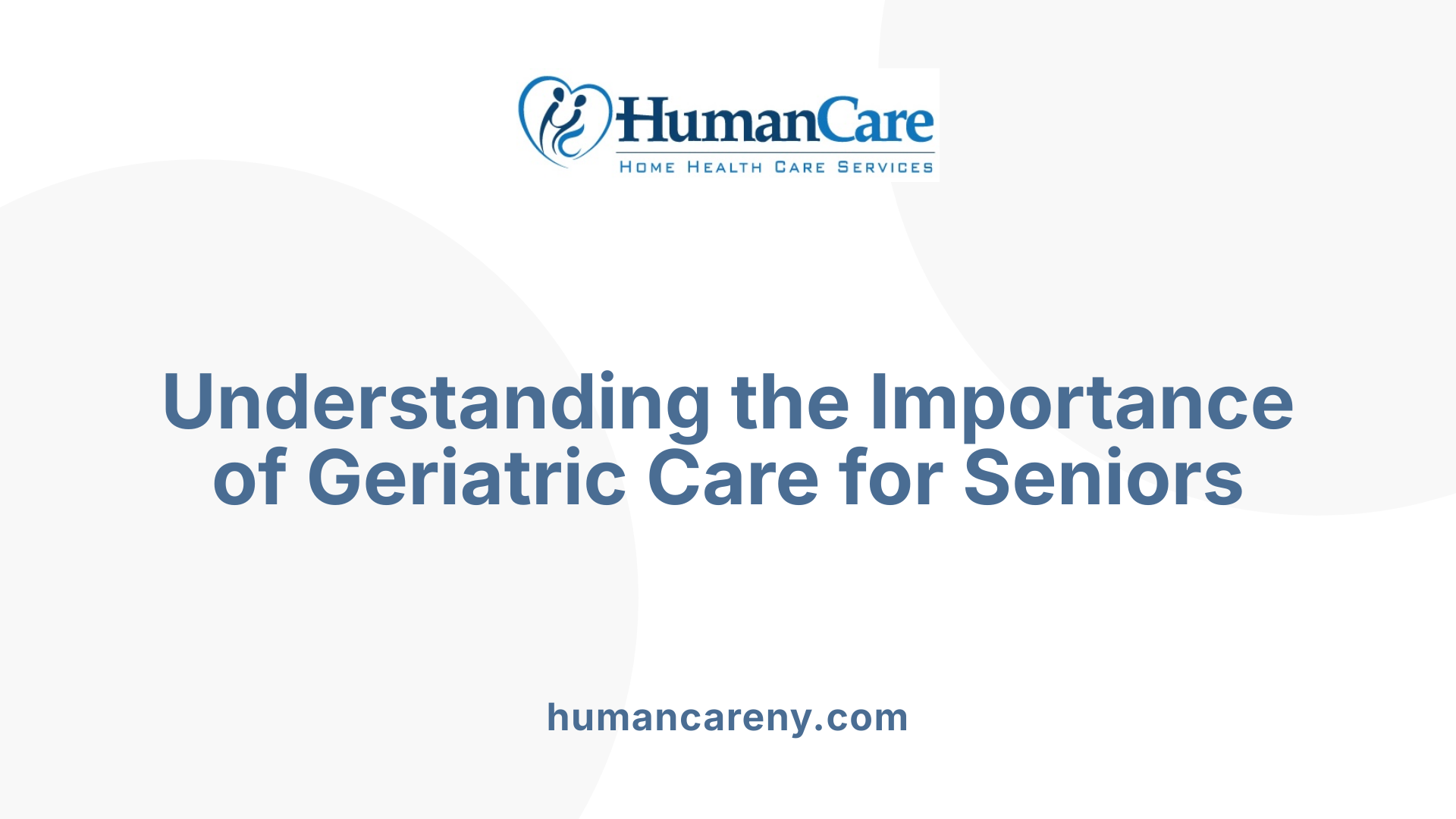
What is the importance of geriatric care?
The importance of geriatric care lies in its specialization in addressing the unique health challenges faced by older adults, who often have complex medical conditions. With the global population of seniors expected to double by 2050, there is an urgent need for more geriatricians to meet this demand.
Geriatric care not only focuses on medical management but also emphasizes holistic approaches that consider patients' overall well-being. This includes aspects like mental health, mobility, and social connections. Preventive measures play a crucial role in this field, allowing seniors to maintain their health and independence while avoiding serious complications from chronic illnesses.
Moreover, geriatric care providers serve as advocates for older adults, ensuring that their needs are prioritized in healthcare decisions. They support both patients and their caregivers by offering guidance and resources, ultimately enhancing the quality of life for seniors. This comprehensive approach allows older adults to live with dignity and autonomy, making geriatric care indispensable in today’s aging society.
Key aspects of geriatric care
| Aspect | Description | Benefits |
|---|---|---|
| Health Challenges | Addresses complex medical conditions | Reduces complications and enhances health outcomes |
| Holistic Approach | Considers mental, emotional, and social needs | Improves overall well-being and quality of life |
| Preventive Measures | Focus on prevention to maintain health and independence | Helps avoid serious health issues |
| Support for Caregivers | Provides education and resources to caregivers | Reduces caregiver stress and enhances care quality |
This blend of targeted medical attention and comprehensive support ensures that the specific challenges encountered by the elderly are effectively managed.
Exploring the Role of Geriatric Care Managers
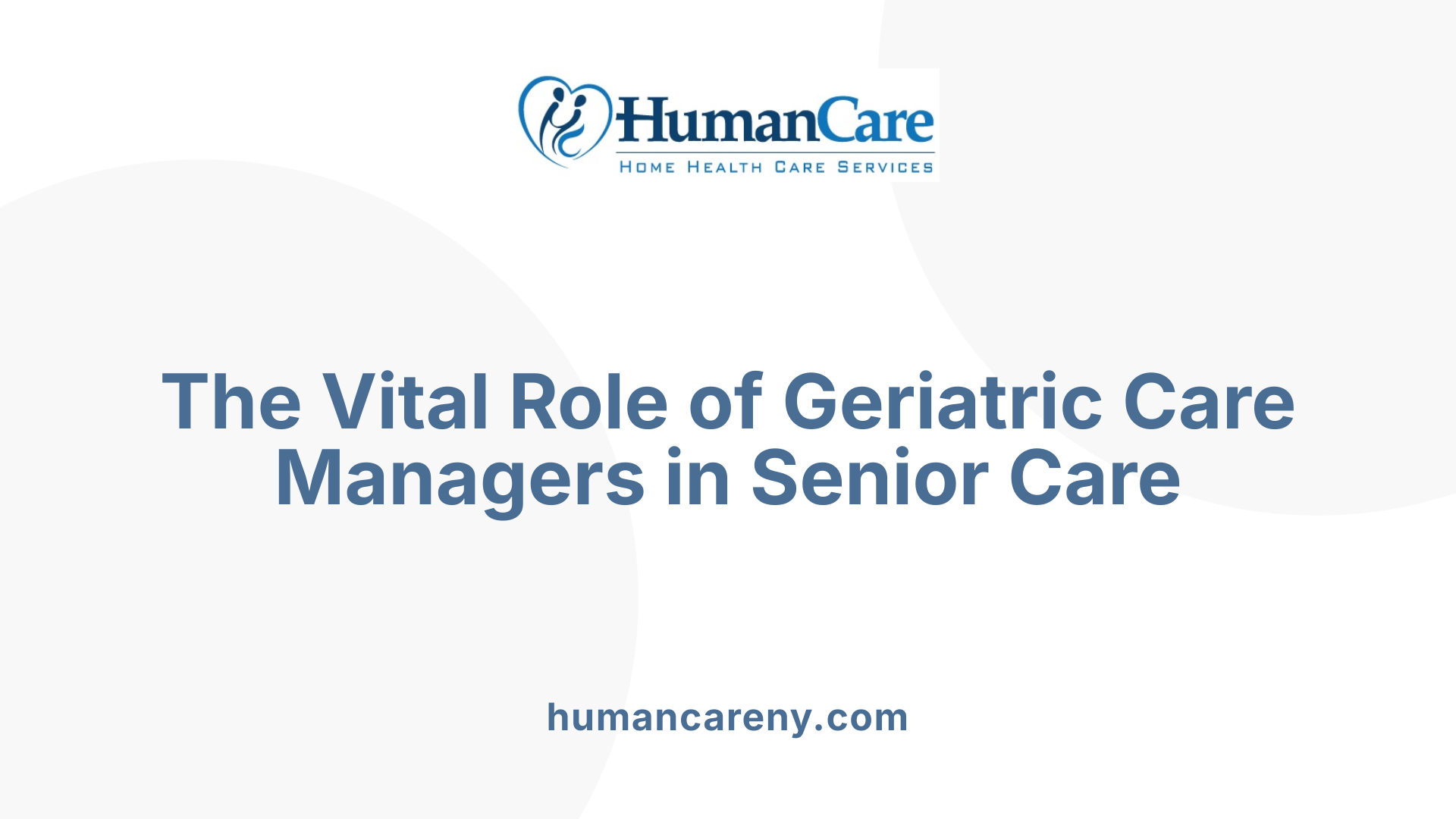
What is the role of geriatric care management?
The role of geriatric care management is to provide comprehensive support for older adults and their families as they navigate the complexities of aging. Geriatric care managers assess individual needs and develop personalized care plans that may include coordinating home health care services, which can assist with medical needs, personal care, and daily activities.
They help families access community resources such as transportation services, meal delivery, and caregiver support. Additionally, they provide guidance on aging in place strategies, ensuring older adults can maintain their independence while receiving necessary assistance.
Overall, geriatric care managers play a vital role in enhancing the quality of life for older adults and alleviating caregiver stress.
Assessment and care planning
Geriatric care managers conduct thorough assessments to understand the unique health and lifestyle needs of older adults. This initial assessment often includes evaluating the individual's home environment, medical history, and daily function. Following this, they create tailored care plans that consider medical, emotional, and social needs, thus simplifying senior living decisions for families.
Resource coordination
A significant part of a geriatric care manager's job is to coordinate essential services. They serve as a liaison among healthcare providers, families, and community resources. By connecting families with services like home health care, transportation, and meal delivery, they help streamline the decision-making process. This coordination alleviates some of the burdens families face, especially when they live far away from their elderly loved ones.
Caregiver support
Geriatric care managers also focus on providing support and education for caregivers. As caregivers often face immense pressure, these professionals offer practical guidance and emotional support to help manage their responsibilities effectively. By addressing concerns such as financial planning and health management, they strengthen the support network surrounding the elderly, enhancing both the caregiver's and the older adult's well-being.
The Role of Family in Caring for Elderly Relatives
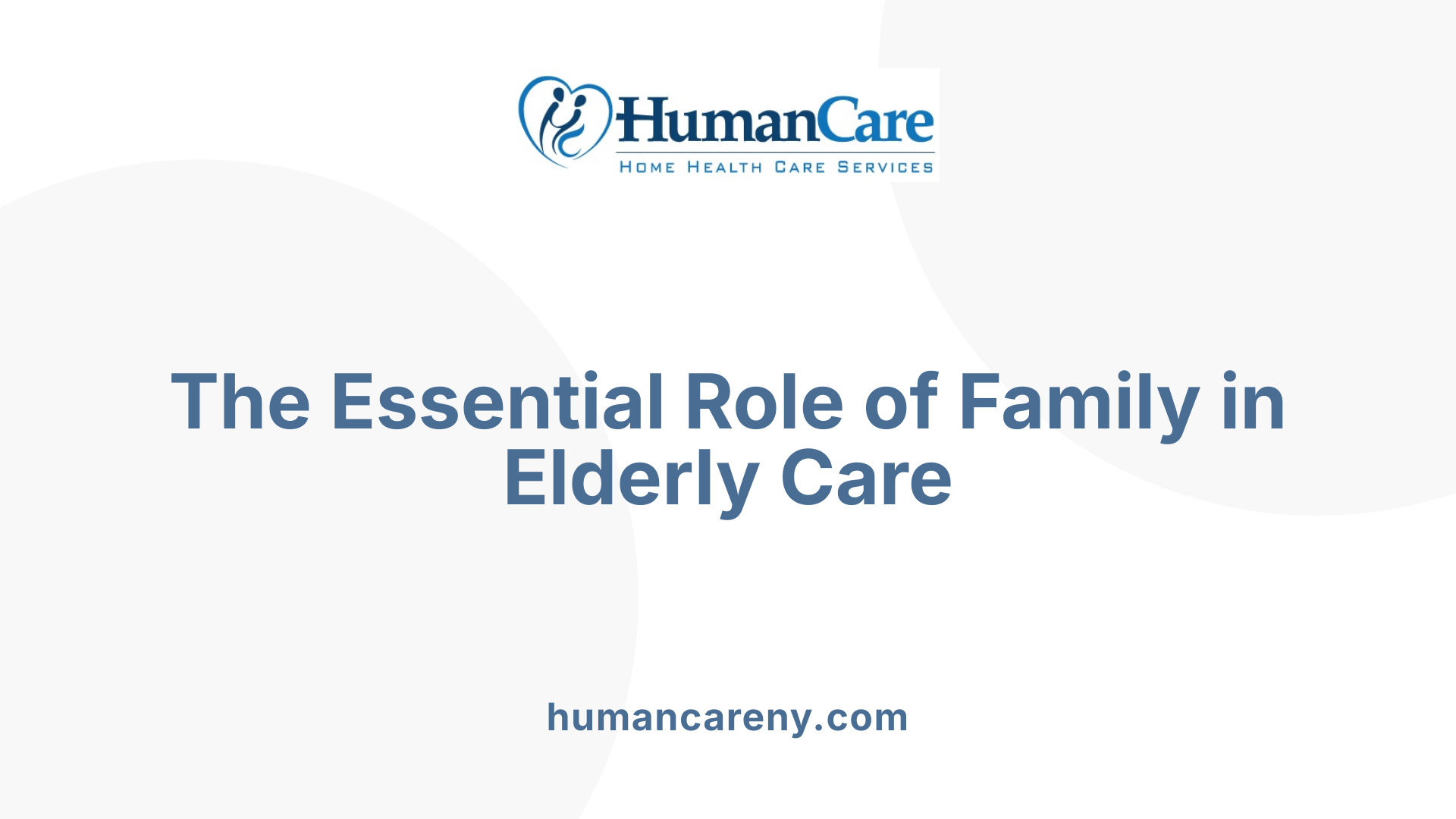
Why is it important to care for older people in our families?
Caring for older individuals within our families is essential for their well-being during vulnerable stages of life. As people age, they often encounter various health challenges, including memory loss, mobility issues, and emotional changes. Family support ensures that these needs are met, allowing seniors to maintain their dignity and self-esteem.
Engaging in their care can significantly impact how older adults perceive their lives. When family members are involved, seniors often feel valued and loved, which directly enhances their mental and emotional health. This involvement fosters strong familial relationships, underlining the importance of unity during life's later stages.
Benefits of active family care
Family caregiving offers numerous benefits not only for the elderly but also for their relatives. Collaborating in the care process allows families to build a sense of purpose and responsibility, promoting gratitude among the younger generations. It also helps younger family members develop skills in empathy and patience, valuable traits nurtured through caring roles.
Moreover, families provide a social support system that combats feelings of loneliness and isolation, common among older adults. This emotional bond elevates the quality of life for seniors by making them feel more connected.
Cultural and emotional aspects
Caring for elderly relatives often reflects cultural values emphasizing respect for elders and familial duty. In many cultures, older adults are revered, and their well-being is seen as a family obligation. This perspective not only showcases the importance of family involvement but also reinforces emotional ties that contribute to crafting a loving and supportive environment for seniors.
Ultimately, by actively participating in their care, families do not just support older adults—they strengthen the family unit as a whole, celebrating their legacy and ensuring a more connected, vibrant heritage.
Understanding the 5 M's of Geriatric Care
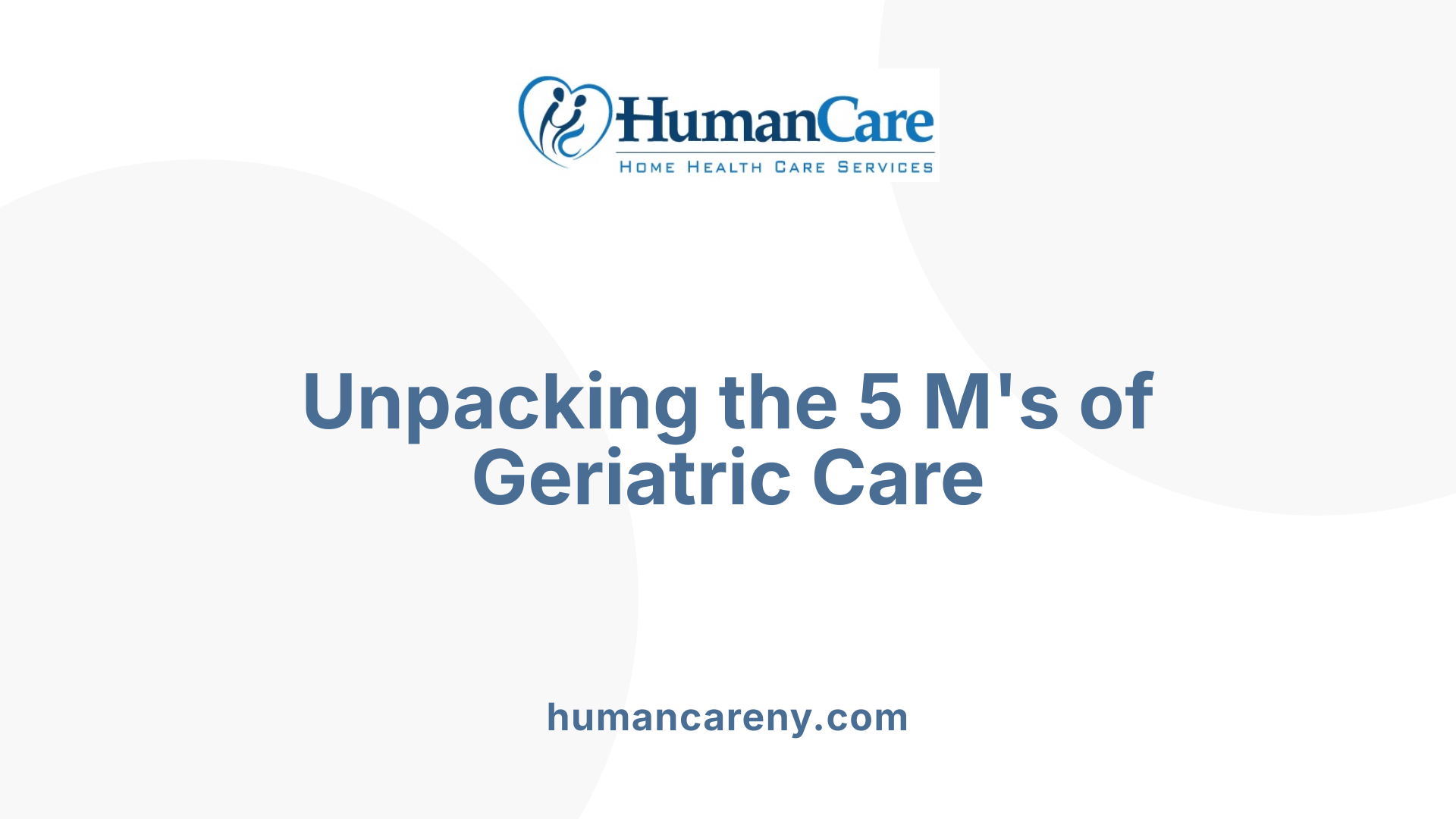
What are the 5 M's of geriatric care?
The Geriatric 5Ms framework encompasses five essential areas that aim to provide comprehensive care for older adults: mind/mentation, mobility, medications, multicomplexity, and what matters most.
Mind/Mentation
This aspect focuses on cognitive health, looking at conditions such as dementia and depression. Addressing mental health issues is crucial for enhancing overall wellness in seniors.Mobility
This involves strategies to improve gait and prevent falls, which are significant risks for older adults. Encouraging physical activity while ensuring safety is vital for maintaining independence.Medications
Monitoring medications is important to manage polypharmacy, which can lead to adverse effects and complications. Regular reviews and an emphasis on optimal prescribing help prevent medication-related issues.Multicomplexity
Acknowledging and managing the challenges that arise from multiple chronic conditions is key. This includes addressing the social determinants that might affect health and care outcomes.What Matters Most
Integrating the patient’s goals and preferences into care plans ensures a more personalized approach. This holistic view enhances the quality of life and aligns care with individual values.
By focusing on these five M's, geriatric care managers can effectively tailor interventions, ensuring health and well-being for their aging clients. This model is increasingly significant as the population ages and health needs become more complex.
The Qualifications of Geriatric Care Managers
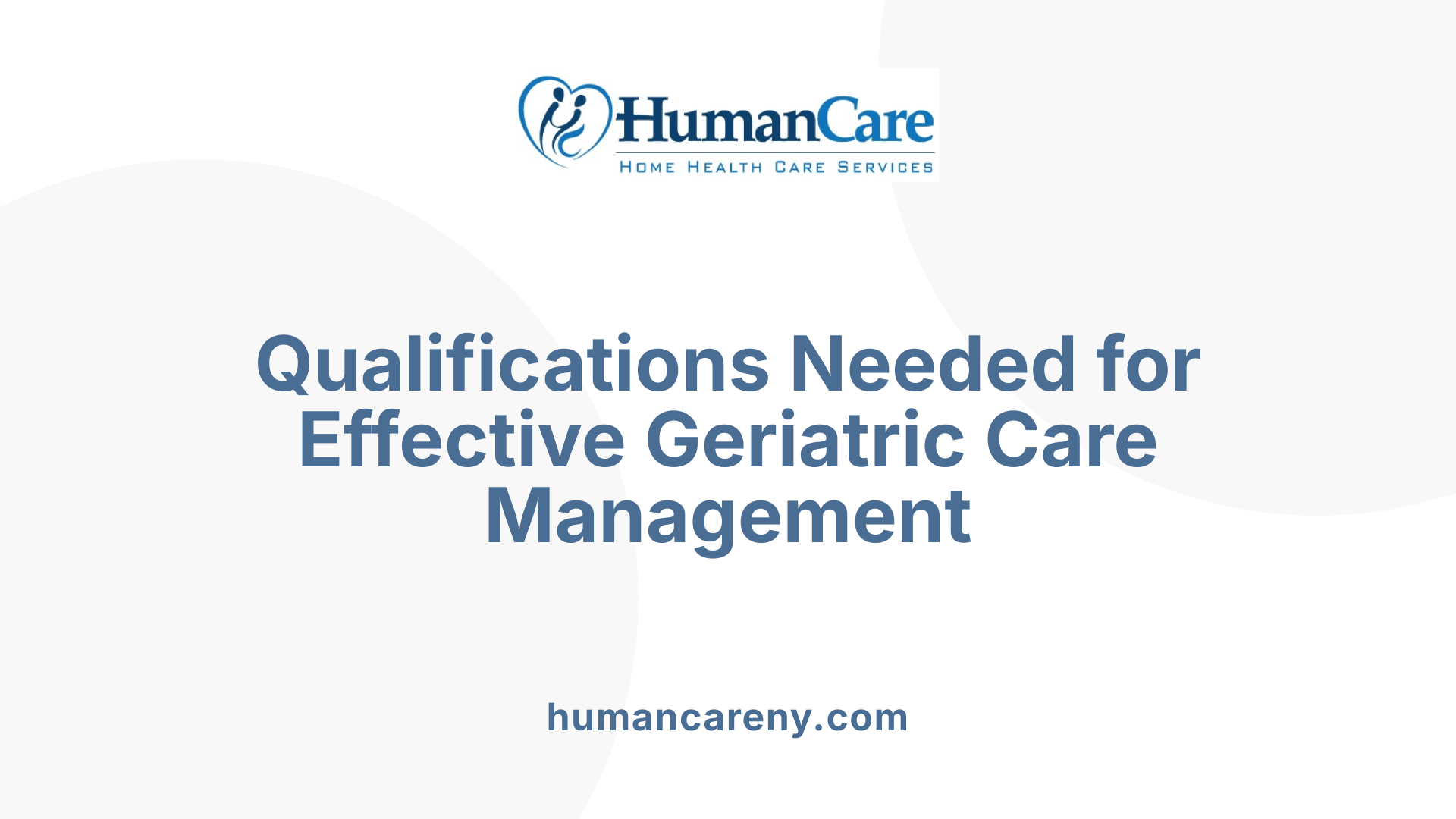
What is the professional background of geriatric care managers?
Geriatric care managers (GCMs) typically come from healthcare backgrounds, predominantly as licensed nurses or social workers. This foundation is critical as it equips them with the skills needed to assess and manage the health and social needs of older adults effectively. Their experience enables them to navigate complex healthcare systems on behalf of the elderly and their families.
Which certifications and expertise are important for GCMs?
Many GCMs further their qualifications with specialized certifications. For example, Certified Care Managers and Certified Dementia Practitioners are recognized credentials that showcase a GCM's commitment to understanding the nuances involved in geriatric care. These certifications not only affirm their expertise but also ensure that they are up-to-date with industry best practices in areas such as cognitive health and emotional well-being.
How do GCMs contribute to senior well-being?
Beyond their professional and educational qualifications, Geriatric Care Managers are trained to create comprehensive, personalized care plans. This involves conducting thorough assessments of the individual needs of older adults, from health care support to social engagement. By coordinating services and fostering communication among healthcare providers and families, GCMs advocate for the rights and dignity of their clients, which significantly enhances the overall well-being of seniors. Their role often extends to providing emotional support, helping to alleviate the stress that comes with caregiving responsibilities.
Emotional and Social Support Provided by Geriatric Care Managers
Emotional Support
Geriatric care managers (GCMs) play a vital role in providing emotional support to older adults and their families. They help seniors navigate the challenges that come with aging, offering a listening ear and practical advice during difficult transitions. This emotional connection can enhance the overall care experience, fostering trust and understanding between the senior and their care team.
Combating Isolation and Loneliness
Social engagement is crucial for maintaining the well-being of older adults. GCMs actively work to combat loneliness by facilitating connections with community resources and social events. They encourage participation in activities that promote socialization, helping seniors to build networks of support and friendship.
Facilitating Family Communication
Effective communication between families and healthcare providers is essential. GCMs serve as intermediaries, ensuring that every voice is heard in the care process. They facilitate difficult discussions about care options, financial planning, and living arrangements, which can significantly improve family dynamics and alleviate the stress associated with caregiving responsibilities.
Selecting the Right Geriatric Care Manager or Support System
Factors to consider
When choosing a geriatric care manager, consider their qualifications, credentials, and experience. Look for licensed professionals such as nurses or social workers who specialize in geriatrics. Check for certifications such as Certified Care Manager or Certified Dementia Practitioner, which can showcase expertise in addressing complex elder care needs.
Resource directories
Utilize directories provided by organizations like the Aging Life Care Association. These can help you find qualified geriatric care managers in your area. Networking within local community resources can also lead to recommendations based on firsthand experiences.
Financial considerations
Understand the billing structure and potential costs of geriatric care management services. Most professionals charge by the hour, typically between $50 and $200, and services often aren't covered by Medicare or Medicaid. Exploring options like long-term care insurance may provide financial assistance, making it essential to factor in your budget when selecting a care manager.
The Path Forward: Enhancing Senior Care
In conclusion, geriatric care management serves as a beacon of support for both seniors and their families, offering tailored solutions that address the diverse and evolving needs of the aging population. As we look to the future, the role of geriatric care managers will only grow in importance, as they continue to advocate for and support the dignity, autonomy, and quality of life of older adults. By understanding the complexities of aging and employing the expertise of these professionals, families can navigate the challenges of senior care with confidence and compassion, fostering a healthier, more supportive environment for our aging loved ones.
References
- Services for Older Adults Living at Home | National Institute on Aging
- How Geriatric Care Managers Can Help Family Caregivers - AARP
- The Role of Geriatric Care Managers in Navigating the Aging Process
- Geriatric Care Managers: Vital Support for Aging
- What is Geriatrics & Why is Geriatric Care Essential for Aging Well
- Understanding the Role of a Geriatric Care Manager in Elder Care
- Aging in Place: Growing Older at Home
- Geriatric Care Managers: “Professional Relatives” to Coordinate Care
- How a Geriatric Care Manager Helps in Senior Living Decisions
- What Is Geriatric Care Management? - Welkin Health
